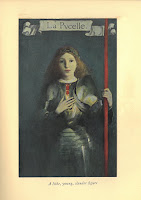 While preparing for a class on mysticism, a library school intern stumbled across a fascinating little book: Saint Joan of Arc by Mark Twain. Given the well-known propensity of the author for edgy humor, we expected to find a waggish re-interpretation of the Maid of Orléans, rife with clever barbs aimed at the French and any number of other hapless victims. Instead, Twain's attitude towards Joan of Arc might best be described as adulation. In the opening pages of this lovely little book, which seems to be an abridged children's version of his more weighty Personal Recollections of Joan of Arc, Twain reprints the latter work's preface and judges Joan's character as occupying "the loftiest place possible to human attainment, a loftier one that has been reached by any other mere mortal."
While preparing for a class on mysticism, a library school intern stumbled across a fascinating little book: Saint Joan of Arc by Mark Twain. Given the well-known propensity of the author for edgy humor, we expected to find a waggish re-interpretation of the Maid of Orléans, rife with clever barbs aimed at the French and any number of other hapless victims. Instead, Twain's attitude towards Joan of Arc might best be described as adulation. In the opening pages of this lovely little book, which seems to be an abridged children's version of his more weighty Personal Recollections of Joan of Arc, Twain reprints the latter work's preface and judges Joan's character as occupying "the loftiest place possible to human attainment, a loftier one that has been reached by any other mere mortal." Although we did not realize it when we first examined this text, Twain's fascination with the Maid of Orléans has been characterized by at least one writer as "among the most baffling and least talked about enigmas in American literature." Although there is debate about when Twain first became enamored of the young girl, there is little argument over the serious and studious interest that the American author had in Joan. He has been described as one of the first writers to introduce her story to an English-speaking audience, nearly four hundred years after her death left her reputation shrouded in controversy.
Although we did not realize it when we first examined this text, Twain's fascination with the Maid of Orléans has been characterized by at least one writer as "among the most baffling and least talked about enigmas in American literature." Although there is debate about when Twain first became enamored of the young girl, there is little argument over the serious and studious interest that the American author had in Joan. He has been described as one of the first writers to introduce her story to an English-speaking audience, nearly four hundred years after her death left her reputation shrouded in controversy.Regardless of Twain's true motivation for his veneration of Joan (a worship that predated the French martyr's beatification by several decades), this work reveals an unfamiliar yet somehow pleasing contrast to the larger-than-life persona that Twain worked so hard to cultivate for so much of his career. Still, for all his apparent earnestness, Twain's preface concludes with a sentence more in keeping with his usual ironic tone: "And for all reward, the French King, whom she had crowned, stood supine and indifferent, while French priests took the noble child, the most innocent, the most lovely, the most adorable the ages have produced, and burned her alive at the stake." This edition, published in 1919, attempts in some small way to rebalance the scales by acknowledging her sainthood in its title, centuries after she was set aflame as a heretic.
To see Saint Joan of Arc, by Mark Twain, come to Rauner and ask for Rare DC103 .C63 1919.

No comments :
Post a Comment